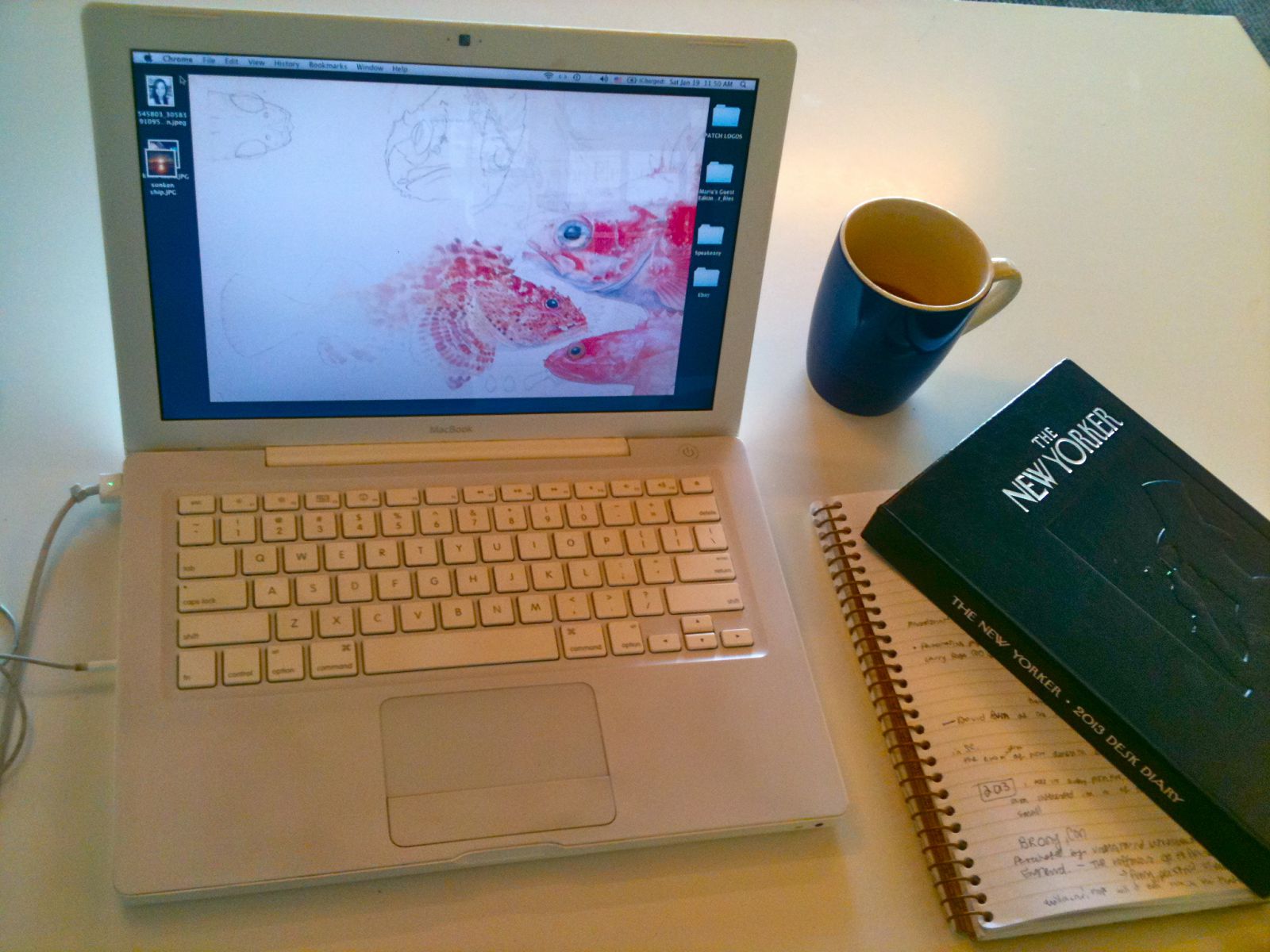From the kitchen table to a shared office space: My Year of Coworking follows a freelance writer through her 2013 transition into the more hopeful frontier of coworking.
Last week, I envisioned the second contribution to My Year of Coworking bobbing along the surface of the blogosphere in the afternoon sun of a “Thursday or Friday.” When that appeared impossible, I thought for sure “by Monday” would be the day.
This year, we’ve seen Mutual Aid in Motion.
From scaling sharing hubs to Mutual Aid 101 trainings, we’re helping communities build the tools they need.
Every dollar fuels lasting resilience – proving that when we move together, we all move forward.
On Wednesday evening, I had finally poked along the gray folds of my brain long enough to arrive at the snag.
It took a walk on the beach to jostle the epiphany, and a break from my coworking desk at Cruzioworks in downtown Santa Cruz, California.
I bought my 24-hour share in coworking earlier this month, for a more respectable run at a writing career than you'd expect from a pajama-clad dreamer.
This post was to be a guide to beating procrastination, crowdsourced by the other freelancers I share an office with, and it is—just scroll down to the open book picture to begin reading the guide.
The delay, or paralysis, though, boils down to this: my coworkers were forthcoming and honest, and compared to them, my procrastinating ways—especially those of late— seemed more abnormal than I'd previously thought. The work ethic I've fine-tuned since grade school is no longer working out.
Not only did everyone surveyed (a timid six—three writers, an entrepreneur, a consultant and a mobile app builder) omit the blue and white world of Facebook as one of the easiest places to get lost when it's time to start a project, I also doubt that any of them have spent unquantifiable chunks of time agonizing over the enormity of a project.
The public "professional" atmosphere of the office has chilled my instinct to go fetal in the face of a particularly menacing and impossible deadline, but it has never gone.

The snag: In dismantling the procrastination problem with the help of my coworkers, I had opened the door to another monster. Just as the cold Pacific ocean froze my ankle bones, I knew: "writers bl@%ck."
As soon as writing evolved into a possibly-lucrative endeavor, along came the pressure associated with it needing to be very good.
Even if it’s just a blog post. Especially, if it’s just a blog post.
But even the Greats had trouble getting started. In Travels With Charley, John Steinbeck confessed "When I face the desolate impossibility of writing five hundred pages a sick sense of failure falls on me and I know I can never do it."
I won't pretend to know how it felt to brave the first blank sheet of paper intended to become The Grapes of Wrath, or even that I have that kind of a relationship with sheets of paper, but I do understand the feeling.
Steinbeck didn't use the word 'fear.' He didn't have to. The causes and remedies for "procrastination" and "writer's block" must overlap in many areas—fear is a debilitating inertia.
Had Facebook existed during Steinbeck's moments of paralysis, would he have been there, chiming in? He was a social guy, after all. Maybe he visited his friends instead, for a strong cup of coffee "warmed two ways," or sailed out into the bay to contemplate the tides from aboard his 22-foot sailboat, Fayre Eleyne.
Whatever Steinbeck's means of entertaining that initial fear, he eventually fought back (his method appears in number 1 of the guide) and completed his book, twenty-seven glorious times.
Modern procrastination is a medusa-like monster, and unless the freelance worker is clacking away on a typewriter, it haunts the very machine they use to work; the World Wide Web an infinite playground for the seeker of distraction.
Started mostly as an excuse to make contact with fellow freelancers, the following compilation shaped up to be a sharp guide for navigating the tempting islands of procrastination, the siren calls of social media and the hum of the refrigerator.
After all, in the world of freelance, if you're not working, you're not getting paid. While you're choosing a filter for that unnecessary grilled cheese sandwich on Instagram, someone else is taking your job.
The Coworkers' Guide to Slaying Procrastination:
1. Set Attainable Goals, and Take it Day by Day
Senior Android Developer, Janet Brumbaugh, sits behind me when we both get to our preferred desks before someone else claims them. This is most days. She humbled me with this tip:
“I've heard that some people who are their own boss tend to procrastinate, but that's never been an issue for me,” said Brumbaugh. “My approach is to set attainable goals each day while keeping an eye on the long view for what I want to get done in the longer term. I do the same thing whether I work at home or at a co-working space.”
Not only is her approach a successful one, (she's developed a bunch of apps including a Voice Recorder app I'm going to be downloading as soon as it's available on the iPhone), she's also a shining example of a person who refuses to entertain the whims of procrastination, or the luxury of using it as an excuse… This should light a fire under most.
Steinbeck did it in a similar way: "Then gradually I write one page and then another. One day's work is all I can permit myself to contemplate and I eliminate the possibility of ever finishing."
He tricked himself into starting, but unlike Brumbaugh, tried not to keep an eye on the long view, since that would have crushed his ability to write. (Do you see what I mean about the writers' procrastination being a different breed?)
2. Change Your Environment: Leave the House, and Maybe, Try Coworking.
All of the coworkers I talked to agreed that they felt productive in the office, with the exception of one common pet peeve: people having loud phone conversations on top of them.
In an instance of pure coworking serendipity, I ran into Bob Prentiss making a salad in the office kitchen yesterday. The former attorney-turned-writer just published a book about how to reach your goals called iMotivateMe.
“I was getting nothing done at home,” said Prentiss, who wrote a blog post about his transition to coworking.
“You improve your physical environment by making it a place you want to be, which I do [here] because I am not distracted by cats wanting to sit on my lap, by a dog who barks when a leaf falls off a tree in my front yard, and dirty floors and a sculpture studio in my back yard.”
Cafes are great, libraries are good, but a coworking office may be your best bet for a space that draws a clean line between home and work, and sets the stage for production:
“It’s refreshing to be around people that are excited about what they do, it creates a positive atmosphere,” said Wesley Jordan, 29, an Internet Marketing Consultant for small business and nonprofits at J7 Media.
A positive environment is a productive one:
“The vibe that's in the air at the space: everyone working, marketing, meeting, networking… it reminds me how focused I need to be,” said Cat Johnson, 40, a freelance writer and regular contributor at Shareable. “One of my favorite quotes these days is, ‘If you're the smartest person in the room, you're in the wrong room.’ Coworking is great because I'm definitely not the smartest person in the room. There are a lot of really inspiring, engaged, proactive, brilliant people.”
3. Turn off Social Media
Browsing Facebook in an office where other workers are building mobile applications feels like what I imagine eating a Snickers bar at the gym would feel like.
In the words of Joe Jelinek, 26, the bandanna-wearing coworker and founder of the crowd funding real estate platform ChimpDig—“I just don’t.”
Just don’t.
What about your cell phone, do you turn that off?

4. Clean up Your Desk and Desktop
A clean desktop, both on your computer and in your physical space, helps many people think more clearly. Try it. Let me know if it helps.
5. Accept that the system is flawed, then move on with your life.
Maybe it's like saying goodbye to cigarettes or sugar or any number of things you do even though you know they're working against you in a very evil way.
“I really believe that procrastination stems from bad habits and learned ways of thinking over a period of years,” said Wesley Jordan. “I know there have been times when I’ve convinced myself that I would do better work if I waited until the last minute to complete a project. This is definitely not the case.”
Indeed, procrastination is a science I perfected in high school: avoid starting a project until stress levels border cardiac arrest, then produce, through an all-night session, a fucking masterpiece.
It’s a flawed system. Anticipated masterpieces are born with ill-received deformities. Deadlines slip. This isn’t high school; it’s no longer acceptable.
6. Identify Your Fear
Are you putting it off because you lack the skills to pull it off?
“If I don't have the skill set to do something, I will avoid doing it,” Prentiss said. “I much prefer doing things I know how to do.”
For example, Prentiss put off building his first website on his sculpting art because he didn’t know how to do it. He got some simple training and voilá, a beautiful website was born.
“This relates to the second factor of motivation, successability, my confidence in my competence,” said Prentiss. “So that's one strategy; figure out why you are avoiding some task and if it is lack of confidence, seek out a source of training.”
7. Start Sketching
This one may be one of the most common causes of procrastination: having no idea what angle to tackle your project from, or what it will even resemble as a finished product. Well, no wonder you haven't started!
“Lack of clarity is a motivation robber. Clarity is a motivator,” said Prentiss.
People procrastinate when they aren’t clear on their next step.
“They kind of know, but aren't clear on exactly what they need to do next. When you are faced with this problem, make what you need to do next the following: figure out what you need to do next, and probably next after that, and write it down."
Or borrow a crayon from a graphic designer and draw it.
8. Make a List
"If you can just get to your workplace and look at a list, you are more likely to get working,” said Prentiss.
And less likely to be seduced by the strange cocktail party of social media. It's more tempting to chime in when you turn on your computer without a set plan. And if you're already 'liking', 'sharing,' and 'tweeting' non work-related material before ten a.m., you're pretty much doomed.
Throw some simple ones in there too, like “drink a glass of water,” or “smile at a coworker who isn’t smiling.” It feels so good crossing off items, any items.
9. Take a Walk on the Beach
Or a nap, or a warm shower. (Does your coworking office really have a shower? I want to hear about it.)
Relaxation often opens doors for creative breakthroughs when they just aren't coming any other way.
“The trick is to give yourself enough of a cushion of time or days that your work doesn't suffer if you put if off,” said Cat Johnson.
10. Don’t Get Carried Away Relaxing in the Name of Creativity
“When there is no cushion and the deadline is looming, you have to make yourself sit down and do it,” said Cat Johnson. “Whether you want to or not. I find that the most resistance is right before I begin. Once I'm writing, my focus is on that, rather than the fact that I didn't want to be working.”
Begin.
11. And if all else fails, Hire a Professional Procrastinatrix
Blogger and best selling author, Seth Godin, (I found him on Twitter, not at Cruzioworks) writes frequently about the “resistance,” and in a recent blog post suggests two people that you might need in your professional life:
“An agonist. While an antagonist blocks an action, the agonist causes it to happen. Even more than a muse, a professional agonist might be exactly what you need to provoke your best work.
And of course, a procrastinatrix. Someone who's only job is to hold you accountable for getting it done, now, not later.”
Who could not support the idea of a “Procrastinatix” as a valid and invaluable profession?
How do you fight procrastination? Tell us in the comments!
Follow Maria Grusauskas on Facebook and Twitter @MariaGwrites.

